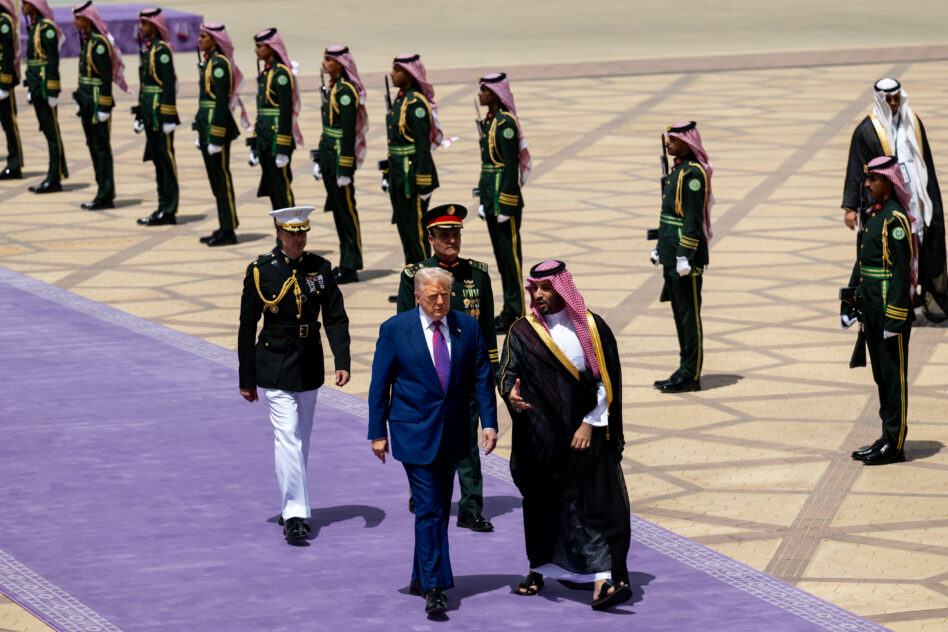In case you missed it, President Trump took a grand ol’ whistle-stop tour through the Middle East last week, visiting Saudi Arabia, Qatar, and the UAE, and securing—per his team—over $2T in deals (though the numbers are a little fuzzy).
You may have overlooked it amidst the hair-flipping, camel-and-horse-parading, and mobile-McDonald’s-making, but a few of the biggest announcements that came out of the tour were actually defense-tech-related.
So, we thought we’d dive a little deeper. What, exactly, did Trump’s Middle East visit mean for US defense tech?
Saudi Arabia: Following his brief visit (where he also met with Syrian President and former al Qaeda leader Ahmed al-Sharaa, but we digress), Trump announced a $600B Saudi-US investment package, including $142B in arms sales. Twelve US firms will sell Saudi weapons and defense systems in five main categories:
- Air Force advancement and space capabilities
- Air and missile defense
- Maritime and coastal security
- Border security and land forces modernization
- Information and communication systems upgrades
While details on what, exactly, will be sold to Saudi Arabia remain scant, the business leaders quoted by the White House on the deal are telling:
- Alex Karp, co-founder and CEO of Palantir, said his company “is proud to play a role in forging the next generation of that alliance by enhancing U.S.-Saudi cooperation on AI and defense.”
- Lockheed Martin Chairman, President, and CEO Jim Taiclet said that he “look[s] forward to working with his administration to support a pathway to fifth-generation air dominance capabilities while further strengthening the Kingdom’s defenses against air and missile threats.”
- Armada CEO Dan Wright said that his company is “partnering with Alturki Holding to bring real-world AI and edge infrastructure to the region” in Saudi.
- L3Harris Chair and CEO Christopher E. Kubasik said his company “look[s] forward to expanding our partnership in communications; datalinks; and intelligence, surveillance and reconnaissance capabilities to protect the joint security interests of the U.S. and Saudi Arabia.”
Importantly, there was no mention of the F-35 in the White House’s recap of the deal. Saudi Arabia has long sought the stealth fighter, but Washington has refused to sell to maintain Israel’s military dominance in the region.
Qatar: Trump’s team said they secured $243.5 billion in deals while in Qatar, including the sale of 210 Boeing aircraft to the kingdom. (This comes just days after reporting revealed Trump planned to accept a luxury plane from Qatar to serve as Air Force One.)
- Raytheon ($RTX) signed a $1B agreement to help Qatar develop its cUAS capabilities.
- General Atomics secured a $2B agreement to sell the kingdom MQ-9B drones.
- Trump said in a speech at Al Udeid air base that Qatar would buy “THAAD [Terminal High Altitude Area Defense] missile batteries, Pegasus [KC-46] refueling aircraft, Desert Vipers, light armored vehicles, amphibious combat vehicles,” alongside the drones.
Lockheed Martin, Northrop Grumman, and Boeing all praised the deals in a White House statement.
The United Arab Emirates: According to the White House, the US secured $200B in deals during his UAE visit. These include commitments by Etihad Airways to buy 28 Boeing jets, investments in US aluminum smelting, and a massive investment in the UAE’s AI infrastructure by Qualcomm.
In terms of defense:
- RTX will partner with Emirates Global Aluminum and the UAE’s Tawazun Council to build up a gallium supply chain (a critical mineral for semiconductors and many defense systems).
- The company will also manufacture cUAS systems in the UAE.
Interestingly, Saildrone’s CEO Richard Jenkins, whose company has drones in the Red Sea, said he’s “proud to play our part in President Trump’s vision, for regional maritime superiority, to enable the safe passage of trade and the interception of illegal or destabilizing activity, throughout the Middle East region.” Lockheed and Northrop Grumman also praised the UAE deal.

